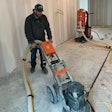

For your hardwood flooring business to be as successful as possible, you need the best performance out of each worker in your office and each guy out in the field. If you're like most business owners, you get frustrated that you seem to be able to motivate some of your employees but not others. Chances are, it's not that those other workers can't be motivated, but that you are using the wrong methods to try to motivate them.
The secret is to package what you want from each individual in a way that makes them want to deliver for you. There are seven classic types of workers, each of which is motivated differently: Commanders, who need control; Drifters, who need flexibility; Attackers, who need respect; Pleasers, who need to be liked; Performers, who need recognition; Avoiders, who need security; and Analyticals, who need certainty. Following is how to use this knowledge to better motivate your staff.
Commanders
Russell is a dependable worker, but he tends to criticize other people's work, second-guess orders given by the lead man or hurriedly complete a job simply to be done with it.
Russell is a Commander. Results-oriented, aloof, bossy and not terribly tactful, Commanders need to be in a position to take initiative. Delegate substantive assignments to them, and employ a hands-off management style. Articulate the desired result and then stand aside and let them figure out the nuts and bolts of the project.
Motivation: Link what you want him to do to how doing so will improve order, control or results. Most importantly, understand that the Commander wants to be valued and validated for his ability to overcome obstacles and achieve results. One solution for Russell may be to give him the responsibility for challenging jobs, making clear the end result and level of work you expect to see after each step. Then, allow him to get it done without constantly looking over his shoulder.
Drifters
Tony is a good kid, but after being on the job for a few days, he tends to get lazy and prefers to shoot the bull with the guys or goof around on the job site. He also tends to show up late, and his van is an organizational disaster. But, he comes up with some great ideas for creative floor designs.
Tony is a Drifter. Free-spirited and easygoing, disorganized and impulsive, Drifters are virtually the opposite of Commanders. They have difficulty with structure of any kind—whether it relates to rules, work hours, details or deadlines.
Motivation: Delegate short assignments, and make sure they have lots of variety. Provide as much flexibility as possible, including what they work on, where they work, with whom they work, and the work schedule itself. Drifters want to be valued and validated for their innovation and creativity, including their ability to improvise on a moment's notice. Tony may perform better if he has the opportunity to do a continual variety of tasks, such as sanding one day and finishing the next, and installing a custom floor after that.
Attackers
Curtis likes to spend his time at work making snide comments about how everybody else is screwing up on the job and prefers to call people "nimrod" as opposed to their actual names.
Curtis is an Attacker. Angry and hostile, cynical and grouchy, Attackers are often the most demoralizing influence in the workplace. They can be critical of others in public and often communicate using demeaning, condescending tones or biting sarcasm. Attackers view themselves as superior to others, conveying contempt and disgust for other workers.
Motivation: Granted, these folks aren't exactly the most loveable of employees, but you do need to be able to motivate them effectively. Start by identifying what they're really good at, then put them in positions of using or imparting that knowledge in ways that don't require much actual interaction with others. Value and validate Attackers for their ability to take on the ugly, unpopular assignments no one else wants to touch, and for their ability to work for long periods of time in isolation. Curtis has an eye for detail and may be better motivated working by himself in the shop on the parts of the project that need to be precut, such as custom parquet. Or, if you need a guy to work into the night sanding that huge, boring job you're behind on, he might be your man.
Pleasers
Jeff is the easiest-going guy on the crew, and everyone really likes him. But when it's his turn to go around the room on his hands and knees to hand-sand the perimeter of the floor, suddenly Jeff is in the Porta-John.
Jeff is a Pleaser. Thoughtful, pleasant and helpful, Pleasers are easy to get along with. They view their work associates as extended family members and have a strong need for socialization at work. Unable to handle conflict, Pleasers can't say "no" to the requests of others, developing instant migraines or stomach problems to escape having to deal with the negativity of refusing to do something.
Motivation: Let Pleasers know how doing whatever it is you ask will make you happy. The more difficult thing is to manage their tendency to put relationships ahead of what's best for the company. To manage this, continually stress the concept of the "greater good." Value Pleasers for the way they humanize the workplace and for their helpful, collaborative work style. Jeff may be more willing to do the unpleasant work if he continually receives verbal reinforcement of how important it is to the completion of the job and how much it's helping out the rest of his crew.
Performers
Kyle is a real cut-up on the job. He likes to be the center of attention, to the point where he may be too caught up with himself to get any real work accomplished. When you call him on it, he's always got a tall tale about why it isn't his fault.
Kyle is a Performer. Witty and charming, jovial and entertaining, Performers are often the favorite personality in the workplace. They're the first to volunteer in public venues and the last to deliver on their promises. Performers can also be self-promoting hustlers who use others as stepping stones on their path to stardom. They'll also avoid accountability for any negative outcomes by distorting the truth and blaming others.
Motivation: Link recognition and other incentives, such as high-profile assignments, to improved teamwork. Value your Performers for their ability to establish new relationships and for their persuasive public speaking skills. Having Kyle be the front man to communicate with the clients may be the best way to motivate him, since he'll have an "audience" and will likely have the necessary skills for dealing with people.
Avoiders
Lyle is the guy who will stay with your company for 50 years and retire there. He's not ambitious about moving up the ladder to be a crew leader, nor do you have to worry about him starting his own contracting business.
Lyle is an avoider. Quiet and reserved, Avoiders are the wallflowers of the world. They create warm, cozy nest-like environments and prefer to work alone. They fear taking initiative and shun increased responsibility because of the visibility and accountability. They'll do precisely what they're told—no more, it's true, but no less, either. Avoiders will sacrifice money, position, growth and new opportunities for the safety of status quo.
Motivation: Always provide detailed instructions, in which the Avoider will find safety, and don't expect to be successful in pushing this fear-based individual toward increased responsibility. Value and validate your Avoiders for their reliability, for their meticulous attention to your instructions and for getting the job done right the first time, every time. Lyle might be motivated by being a solitary finish guy. Being alone will make him comfortable, and his attention to detail will be useful, since he'll do a meticulous finish job.
Analyticals
Larry is in charge of costing jobs and giving estimates to customers. His work is immaculate—when he actually gets to it. Often, he puts jobs off until the last minute, which has upset people in the past. And when faced with requests for custom designs or unusual products from customers, he has the tendency to be melodramatic and negative about the work necessary, giving the impression that the job will be much more difficult than it actually will.
Larry is an Analytical. Cautious, precise and diligent, Analyticals are the personification of procrastination. This sometimes incapacitates them in times of urgency. Their ability to multitask mentally results in poor eye contact and flat intonation.
They scrutinize the ideas of others and anticipate all that could go wrong, which creates an inaccurate impression that they're negative. They're socially awkward and prefer that all communications be written or electronic—not in person.
Motivation: Give them time to complete each task before assigning another, and demonstrate respect for data and for the analytical function. Value and validate your Analyticals for their commitment to accuracy, and for their ability to anticipate and evaluate problems far enough in advance to allow risks to be reduced. To motivate guys like Larry, praise the accuracy on their estimates or other technical work they do, but also give them a firm schedule with deadlines, preferably in writing.
The "one-size-fits-all" cookie-cutter approach to motivating others won't work. Instead, you should customize your methods to each employee you manage. Doing so will allow you to tap into the energy of your staff—that which they aren't required to do, but that they want to.
































